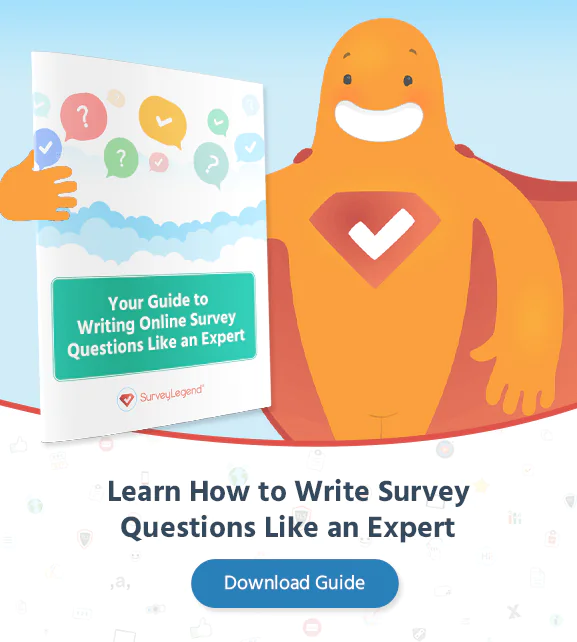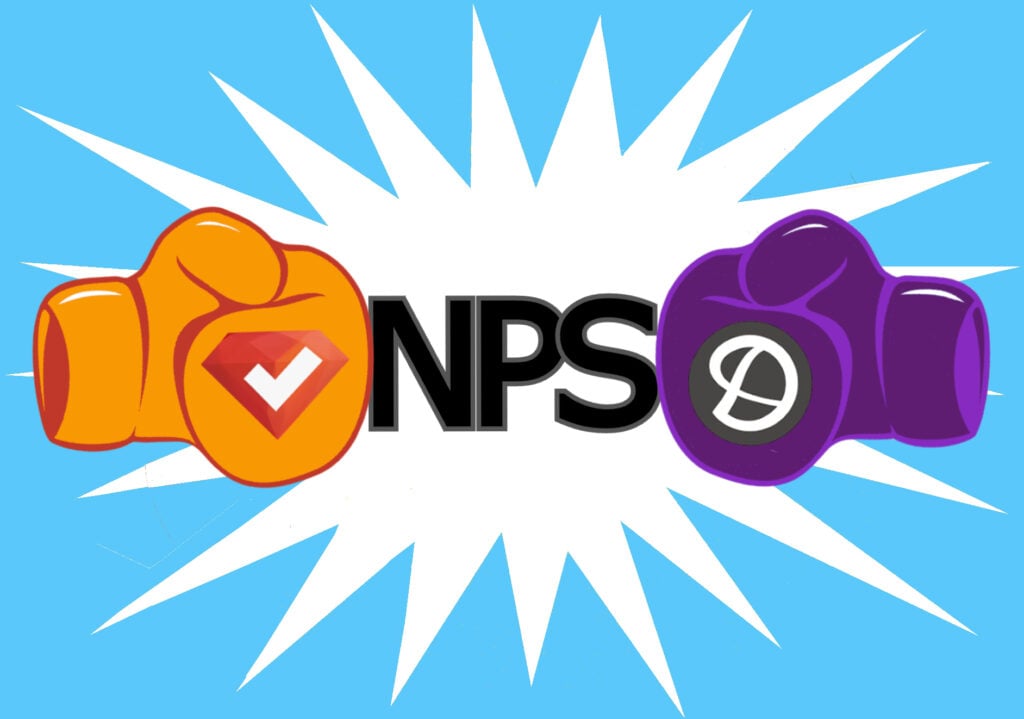No longer the stuff of science fiction, artificial intelligence (AI) has arrived. However, there are no post-apocalyptic landscapes or homicidal robots; rather, the technology is being used to improve and enhance human lives. Today, there are even AI surveys, with researchers and marketers using the technology to create AI survey questions. How does this work? What are the advantages and disadvantages? In this blog, we’ll take a look at using artificial intelligence for surveys.
Create Your FREE Survey, Poll, or Questionnaire now!
4 Types of Artificial Intelligence (AI)
AI, which is broadly defined as technology that performs simple to complex tasks that once required human input, has four classifications. As of now, only two are a reality.
1. Reactive AI
This is the simplest form of artificial intelligence. With this model, a machine is programmed to provide an output based on input it receives. This output is consistent, and no learning takes place on the part of the machine. Examples include chess-playing computers, email spam filters, and even movie recommendations on Netflix or music suggestions on Spotify.
2. Limited Memory AI
This model of AI technology also uses pre-programmed input, but it learns over time and builds knowledge through observation of actions and analysis of data as well. A good example of this AI model includes self-driving cars, which observe road conditions, traffic signals, other vehicles, and so on in order to make decisions.
Another example is chatbots. You’re familiar with predictive text on your smartphone, which guesses what words will come next based on the words you’ve already inputted. Chatbots are like predictive text on steroids, generating responses to questions with often startlingly natural language. AI for marketing and research is becoming more and more common, so we’ll talk more about this in a moment!
3. Theory of Mind AI
While not here yet but likely on the horizon, this form of AI will be highly intelligent and able to hold meaningful conversations with humans. In theory, it will be able to understand and remember emotions as well, adjusting its behavior accordingly when interacting with humans.
4. Self-Aware AI
This is the type of AI that Hollywood loves to feature in movies, though at this time, it is just a concept. This form of AI would come to exist when machines develop their own emotions and obtain a level of consciousness and intelligence similar to humans.
Artificial Intelligence Surveys
When writing about limited memory AI, we mentioned chatbots. While most people think of chatbots as the bot or “person” at the bottom of a webpage or help screen that can answer, in a human fashion, pretty standard questions, today’s chatbots have really leveled up thanks to innovations like ChatGPT.
For the best description of ChatGPT, here’s a definition from ZDNet.
“ChatGPT is a natural language processing tool driven by AI technology that allows you to have human-like conversations and much more with the chatbot. The language model can answer questions and assist you with tasks, such as composing emails, essays, and code.”
So how does it work? Users type in a question and ChatGPT responds based on the limitless knowledge that is available to it through the internet; it also learns how well it did by user feedback so it can improve answers in the future.
In the screenshot below, you’ll see my ChatGPT query and its response (I must say, there’s no arguing with that answer 😊).

In addition to gathering content as in the example above, some marketers and researchers are using chatbots like ChatGPT to develop AI survey questions. Below, the AI is asked to give me five employee survey questions.

Pretty neat, right? While using ChatGPT or other chatbots to create survey questions can certainly be a time-saver, there are some disadvantages. Let’s take a look.
5 Disadvantages of AI Survey Questions
AI chatbots can be very useful, but may prove to be problematic in some situations. For example, in education settings. In a recent survey, a number of teachers stated that students are using ChatGPT to cheat on tests and complete their homework assignments. But for the purposes of this blog, we’ll focus on artificial intelligence for surveys, where there are also potential drawbacks.
Despite the convenience of using a chatbot to create AI survey questions, marketers and researchers should be aware of the following five disadvantages of artificial intelligence survey questions.
1. Using the Wrong Voice or Tone
While an AI chatbot may be able to put together survey questions for you, the questions likely will not reflect a brand’s personality (for example, if you’re known as a “fun” retailer, with quirky messaging, AI generated questions may sound very basic and/or serious). This sort of disconnect can be off putting for many survey takers.
2. Lack of Emotion
Some surveys require human understanding. For example, if you’re conducting a survey on a sensitive topic and don’t word things just right, or fail to show empathy in your questions, you could upset or insult people. Either way, this will make them drop out of the survey and lower your response rates.
3. Lack of Survey Logic
Survey logic flows are what allow you to create “smart surveys” that intelligently react to respondents’ answers. With logic flows, each answer a participant gives can trigger a different consequence; for example, if they answer “No” to a question, they’ll be taken to a different set of questions than someone who answered “Yes.”
Simply using AI survey questions as the machine generates them, and placing them into your survey as-is, means there is no survey logic. This can lead to respondents being asked questions that don’t apply to them or contradict their previous statements.
4. Introduction of Survey Bias
While survey bias can easily be introduced into questions written by humans, it can also be introduced into AI survey questions (after all, the AI learns from us). So, it’s important, if using AI survey questions, to weed out any that include a form of survey bias, such as leading or loaded questions, absolute or unclear questions, or double-barreled and multiple answer questions.
5. Lack of a Human Touch
Chatbots, as a form of limited memory AI, don’t comprehend emotion (sure, they can be pre-programmed to understand when someone is angry based on their word choice, but may not respond appropriately).
While a chatbot may be able to draft an initial series of questions, it often won’t be able to create follow-up questions based on responses. So, if you send out an AI-generated customer experience survey and the respondent is very negative, you’ll still need to address their issues on your own in a follow-up survey that has a human touch the AI doesn’t possess.
Conclusion
Whether to conduct a survey using AI-generated questions is best left to the individual or company creating the survey. Obviously, using AI survey questions can save time, money, and even raise questions the researcher or marketer hadn’t thought of. However, AI-generated questions can also be problematic, lacking a human touch, emotion, and survey logic, while potentially using the wrong voice or tone and introducing bias.
Our take at SurveyLegend? When using AI for research or marketing surveys, use it simply for brainstorming and to generate ideas. Then, craft your own questions. AI is best used to enhance your efforts, not eliminate all effort.
Whether you’re creating an AI survey or crafting your own questions, you can use SurveyLegend to build them. Our online survey maker creates gorgeous and secure surveys, and allows you to include a wide variety of types of questions, even including survey pictures. Start today for free!
How do you feel about chatbots for surveys? Have you ever used ChatGPT? Will you use it in the future? Let us know in the comments!
Create Your FREE Survey, Poll, or Questionnaire now!
Frequently Asked Questions
Artificial intelligence, or AI, is an overarching term for technology that can perform simple to complex tasks that once required human input. More advanced AI can simulate human behavior.
1. Reactive AI
2. Limited Memory AI
3. Theory of Mind AI
4. Self-Aware AI
A chatbot is a form of artificial intelligence that simulates human conversation through programmed data and machine learning. It is typically used by companies in place of a live human. Other Times, the chatbot answers basic questions and then transfers users to a live human as the questioning escalates.
An AI survey is created using chatbots to develop survey questions. While this can save time, money, and generate ideas, it can also lead to surveys that lack a human touch, emotion, or logic, or introduce survey bias or the wrong voice and tone.





